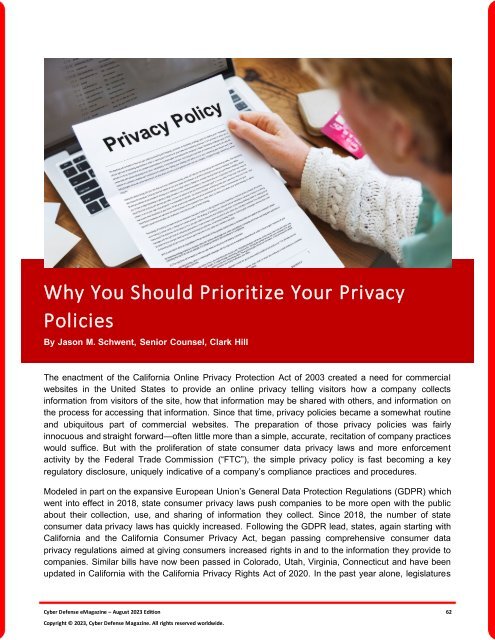The Cyber Defense eMagazine August Edition for 2023
Cyber Defense eMagazine August Edition for 2023 #CDM #CYBERDEFENSEMAG @CyberDefenseMag by @Miliefsky a world-renowned cyber security expert and the Publisher of Cyber Defense Magazine as part of the Cyber Defense Media Group as well as Yan Ross, Editor-in-Chief and many more writers, partners and supporters who make this an awesome publication! Thank you all and to our readers! OSINT ROCKS! #CDM #CDMG #OSINT #CYBERSECURITY #INFOSEC #BEST #PRACTICES #TIPS #TECHNIQUES
Cyber Defense eMagazine August Edition for 2023 #CDM #CYBERDEFENSEMAG @CyberDefenseMag by @Miliefsky a world-renowned cyber security expert and the Publisher of Cyber Defense Magazine as part of the Cyber Defense Media Group as well as Yan Ross, Editor-in-Chief and many more writers, partners and supporters who make this an awesome publication! Thank you all and to our readers! OSINT ROCKS! #CDM #CDMG #OSINT #CYBERSECURITY #INFOSEC #BEST #PRACTICES #TIPS #TECHNIQUES
Create successful ePaper yourself
Turn your PDF publications into a flip-book with our unique Google optimized e-Paper software.
Why You Should Prioritize Your Privacy<br />
Policies<br />
By Jason M. Schwent, Senior Counsel, Clark Hill<br />
<strong>The</strong> enactment of the Cali<strong>for</strong>nia Online Privacy Protection Act of 2003 created a need <strong>for</strong> commercial<br />
websites in the United States to provide an online privacy telling visitors how a company collects<br />
in<strong>for</strong>mation from visitors of the site, how that in<strong>for</strong>mation may be shared with others, and in<strong>for</strong>mation on<br />
the process <strong>for</strong> accessing that in<strong>for</strong>mation. Since that time, privacy policies became a somewhat routine<br />
and ubiquitous part of commercial websites. <strong>The</strong> preparation of those privacy policies was fairly<br />
innocuous and straight <strong>for</strong>ward—often little more than a simple, accurate, recitation of company practices<br />
would suffice. But with the proliferation of state consumer data privacy laws and more en<strong>for</strong>cement<br />
activity by the Federal Trade Commission (“FTC”), the simple privacy policy is fast becoming a key<br />
regulatory disclosure, uniquely indicative of a company’s compliance practices and procedures.<br />
Modeled in part on the expansive European Union’s General Data Protection Regulations (GDPR) which<br />
went into effect in 2018, state consumer privacy laws push companies to be more open with the public<br />
about their collection, use, and sharing of in<strong>for</strong>mation they collect. Since 2018, the number of state<br />
consumer data privacy laws has quickly increased. Following the GDPR lead, states, again starting with<br />
Cali<strong>for</strong>nia and the Cali<strong>for</strong>nia Consumer Privacy Act, began passing comprehensive consumer data<br />
privacy regulations aimed at giving consumers increased rights in and to the in<strong>for</strong>mation they provide to<br />
companies. Similar bills have now been passed in Colorado, Utah, Virginia, Connecticut and have been<br />
updated in Cali<strong>for</strong>nia with the Cali<strong>for</strong>nia Privacy Rights Act of 2020. In the past year alone, legislatures<br />
<strong>Cyber</strong> <strong>Defense</strong> <strong>eMagazine</strong> – <strong>August</strong> <strong>2023</strong> <strong>Edition</strong> 62<br />
Copyright © <strong>2023</strong>, <strong>Cyber</strong> <strong>Defense</strong> Magazine. All rights reserved worldwide.

















